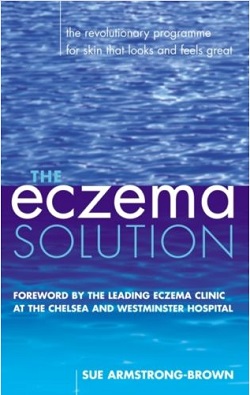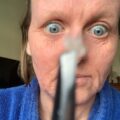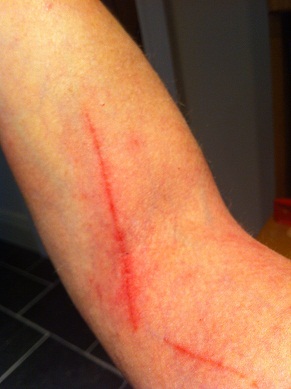Before I begin I strongly believe that berating a person for scratching their eczema is the worst kind of well meaning advice. Trust me, if you have eczema and it’s in full force, you cannot stop scratching. And sometimes that is OK. Don’t beat yourself up if you can’t resist that horrible incessant itch that seems to live deep inside the skin, and only subsides when you’ve damaged your skin.

I wanted to share with you something that I’m trying at the moment. It’s an idea I’ve seen discussed before in a book called The Eczema Solution.
But whilst I tried to break the ‘habit’ of itching back then, it didn’t work. Because if you have things in your life that are triggering allergic reactions and hives your skin will be on fire and almost impossible to avoid scratching unless someone ties you up!
If you can take a step back and notice that what you’re doing is often habitual then there are huge benefits from learning to acknowledge, analyse and then begin to reduce the amount of times you scratch.
First of all, why do you itch? Can you teach yourself to scratch less? Because there are definitely different kinds of scratching:
The many differnt types of itching/scratching:
- Unavoidable scratching – when the irritation or allergic reaction is too strong to avoid
- Little Scratching – when you have a minor itch, tickle, pain… call it what you will and reach to relieve it.
- Habitual scratching – When it becomes so commonplace that you scratch every time you do certain things, like apply emollient, go to the loo, get changed, shower, overheat… It’s almost like you just scratch regardless of whether you are itchy and then once you are scratching, your skin is itchy because you itched it! Make sense?
- Waking up the itch – When you are just rough with your skin and you take it from calm and OK to furious itching just by rubbing, not applying moisturiser gently… whatever it is. You can ‘wake up’ your skin and cause itchiness by mistake.
- TSW bone deep itch – If you’re not familiar with Topical Steroid Withdrawal, this is a condition where topical steroids become less effective and the withdrawal process leaves you with VERY itchy skin as it heals from deep down within the skin layers. For this you just need to ride it, find ways to do less damage and get through the healing because it’s just gonna itch as it heals.
Understanding where you are with your skin will help you move forward.
If this sounds familiar to you then think about reducing some of these, because there are so many times when it would be possible to reduce scratching
I think I scratch for a number of reasons and not just because the act of tearing at an itch can feel amazing, and is the only way (our brain tricks us here) to stop the annoyance and pain of the itch. I think that I often scratch almost as a punishment to myself. I could treat my skin better but it’s almost like I’ve decided it’s not worth it, that my skin is awful anyway so I give myself permission to destroy it. I might as well. Not nice to read or acknowledge really. But this is mindfulness.
What is mindfulness?
First of all, mindfulness is NOT about being happy all the time and seeing the positive in everything. I am not suggesting for a moment that if you were more in control, more positive, more confident or kinder to yourself and lived every second in the moment that it would be any easier to avoid scratching. Far from it. It is more about truthfully accepting a situation and then looking for ways to improve things, if you can. And if you can’t, learning to live with things the way they are. It’s not about being happy all the time. It’s OK to feel bad about having eczema. It’s not fair, but it is what you have so you need to accept it and learn to control it, rather than it controlling you.
What I’m suggesting is merely that you see it for what it is. It’s the first step to understanding the itch and then in turn learning how to control it, even just some of the time.
When you scratch, don’t try to stop, just notice it. Think to yourself, ‘Oh there I go, scratching again’, and just see it. Really see it.
- Why did you scratch?
- What made you scratch?
- Where were you?
- What were you doing?
- How were you feeling?
- Was there a trigger or did it seem just gratuitous orgasmic itching it?
To start off with just acknowledge that you itch and think about why. Don’t stress. Don’t beat yourself up about it. Don’t feel bad. It is what it is. The book, The Eczema Solution suggests getting a clicker to count every time you scratch. I did this and it easily ran into the thousands. Quite shocking to acknowledge the sheer level of discomfort.
You have eczema, psoriasis or whatever skin condition makes you itch like blazes and it’s a natural reaction. It’s evolution; if you go back to caveman times, the instinct would have been to brush off the insect from the skin in case it bit you.
Just be. Just be the eczema person you are. The next step, after days or weeks of assessing the status quo is to begin to change the habit of a lifetime. No mean feat! But there are many techniques for doing this. These will be the subject of another blog but it’s not rocket science. You’ll have to keep reading the blog to find out, but think about just observing, looking at the itching area, if you can see it. What does the skin look like? It is raised? Bumpy with hives, or red, sore, scabbed etc. Think about whether you could avoid scratching. Just ignoring an itch can be very distracting, but can you stroke, hold, press, tap or employ avoidance tactics or keep your hands busy?
It’s not going to be easy but can we do this chaps? I think every potential scratch avoided is a minor victory so good luck! I have so far seen off an avalanche of potential skin destroying itches but I have given in to lots too. It’s going to take time… but I am determined to try this.
Treat your skin like it were a new born baby
A friend of mine called Rebecca told me about how she managed to stop scratching her skin, she said she found herself watching her newborn baby struggle with his own skin and being driven to use all her powers to prevent him doing damage and help him heal. While doing this for her son she realised that she took little or no care for own eczema ravaged skin. Instead of feeling guilt, she took the bull by the horns and has fought to fight back and overcome the habit of itching. Not an easy thing to do but once you realise how precious you are, how valuable, how lovable and how much your skin needs you to cherish like it were a newborn… it does slowly, bit by bit, become something you can work on.
Does your skin itch? Is it unbearable? How do you cope with the itch and do you think it’s possible to reverse the habit and stop scratching? for good?
You may find the following of interest
- 30 tips to help you stop scratching
- 10 more ways to stop scratching
- The Shape of Skin – Eczema poetry books stuffed with poems about scratching!
- 30 ways to stay cool for itchy eczema skin












Hi Ruth nice blog lol I know all those feelings oh so very well, but and there’s always a but my main itching flare ups happen at night and I have even tried using motorbike mittens but then my hands get way too hot and then rip the mittens off and now deal with the confounded itch cos by now I’m hot all over and every thing and every body part is screaming at me to scratch as I’m too hot which also makes me itch. OH and this is while I’m asleep and don’t realise till the morning cos 1 my everything hurts and 2 my sheets are covered in blood damn more expense new sheets. Love the blog .
Kind regards Ian Morris
Yup… nighttime itching is horrible. Not sure if I have any very good tips for this, apart from making sure the room is cool, ventilated and you are well moisturised when you go to bed. Also, when you get really itchy like that get up! Walk around. Try distraction. Make yourself a drink (not caffein) and then try to go to sleep again. I am so itchy today and failing at anything mindful but fear that alcohol (from last night) has made my skin dry, sore and inflamed. My own fault – so can I give up the booze in the interest of my skin?